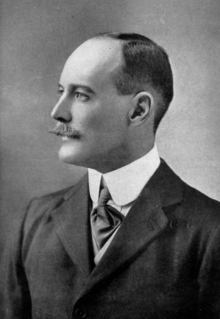William Shakespear | |
|---|---|
 | |
| Born | William Henry Irvine Shakespear 29 October 1878 Bombay, British India |
| Died | 24 January 1915 (aged 36) Lake Jarrab, Al Majma'ah, Ottoman Arabia |
| Occupation | Civil servant |
| Known for | Explorer who mapped uncharted areas of Northern Arabia |
Captain William Henry Irvine Shakespear, CIE (29 October 1878 – 24 January 1915), was a British civil servant and explorer who mapped uncharted areas of Northern Arabia and made the first official British contact with Ibn Sa'ud, future king of Saudi Arabia. He was the military adviser to Ibn Sa'ud from 1910 to 1915, when he was shot and killed in the Battle of Jarrab by Ibn Shraim. He was buried in Kuwait.
Arabian expeditions
While in Kuwait, Shakespear made seven separate expeditions into the Arabian interior, during which he became a close friend of Ibn Sa'ud, then the Emir of the Nejd. It was Shakespear who arranged for Ibn Sa'ud to be photographed for the first time. Ibn Sa'ud had never seen a camera before. In March 1914, Shakespear began a 2,900-kilometre (1,800 mi) journey from Kuwait to Riyadh and on to Aqaba via the Nafud Desert, which he mapped and studied in great detail, the first European to do so. In November 1914, the British government in India asked Shakespear to secure Ibn Sa'ud's support for the British-Indian Mesopotamian Expeditionary Force, which had just taken Basra.
Aftermath
It has been suggested by some authorities, notably St. John Philby, that the Arab Revolt against the Ottoman Empire might have been very differently directed if Shakespear had survived, that the British would have supported and armed Ibn Sa'ud rather than Sherif Hussein ibn Ali.
"His death... was a great loss to his country, but it was a disaster to the Arab cause. It must certainly be reckoned in the small category of individual events which have changed the course of history. Had he survived to continue a work for which he was so eminently suited, it is extremely doubtful whether subsequent campaigns of Lawrence would ever have taken place in the west..."
Arabia, H. St. John Philby, London (1930), pp. 233–234.
Further reading
- Douglas Carruthers, Captain Shakespear's Last Journey (Royal Geographical Society, 1922)
- Alan Dillon, Captain Shakespear: Desert Exploration, Arabian Intrigue and the Rise of Ibn Sa'ud (Medina, 2019) ISBN 978-191148733-3
- H. V. F. Winstone, Captain Shakespear: A Portrait (Jonathan Cape, 1976) ISBN 978-022401194-5
External links
- Biography, with a picture.
- The Captain and the King, from Saudi Aramco World.
- Notes by the biographer Harry Victor F. Winstone and David Wingate on a Shakespeare Family Genealogical Site
- Memorial Stone
- BBC - Shakespear of Arabia
